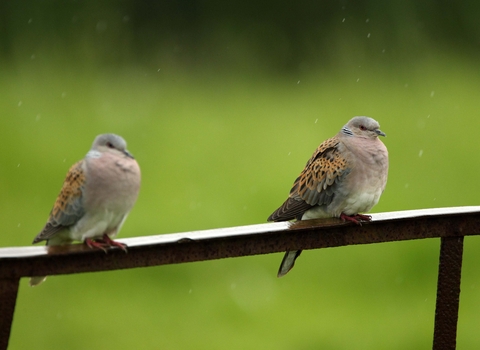
©Gary Huston

©Luke Massey/2020VISION
Turtle dove
The turtle dove is the UK's fastest declining bird species and is on the brink of extinction. A small and pretty pigeon, it breeds in lowland England and winters in Sub-Saharan Africa.
Scientific name
Streptopelia turturWhen to see
April to SeptemberSpecies information
Category
Statistics
Length: 26-28cmWingspan: 50cm
Weight: 140g
Average lifespan: 2 years
Classified in the UK as Red under the Birds of Conservation Concern 5: the Red List for Birds (2021). Priority Species under the UK Post-2010 Biodiversity Framework. Listed as Vulnerable on the global IUCN Red List of Threatened Species.
About
The turtle dove is a small pigeon, just a little bit smaller than collared dove. It breeds in woodlands, orchards and well-wooded parks, mainly in the warmer, drier south and east of the UK. Adults feed on cereal and wildflower seeds, but feed their young 'pigeon milk' - a regurgitated, milky substance from a food-storage organ called a 'crop'.How to identify
Much more colourful than the collared dove, the turtle dove has an orangey-brown and black patterned back, a blue-grey head, pink chest and three or four black and white stripes forming a patch on the side of the neck. It has a purring 'turrr turrr turr' song (hence its Latin name, Streptopelia turtur), compared to the familiar 'hoo hoooo-hoo' of the collared dove.Distribution
Mainly found in south and east England and the lowlands of Wales.Did you know?
Turtle doves are summer visitors, spending the winter in Sub-Saharan Africa and migrating more than 5,000 km to get there. They undertake a perilous journey - huge numbers are shot as they pass through France, Spain and Morocco, and also when they reach their wintering grounds in Senegal.Watch
Turtle Dove (https://vimeo.com/453700289)
Turtle Dove by John Bridges
